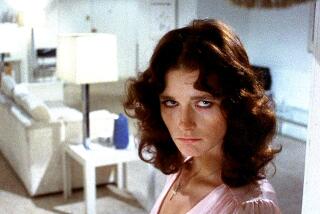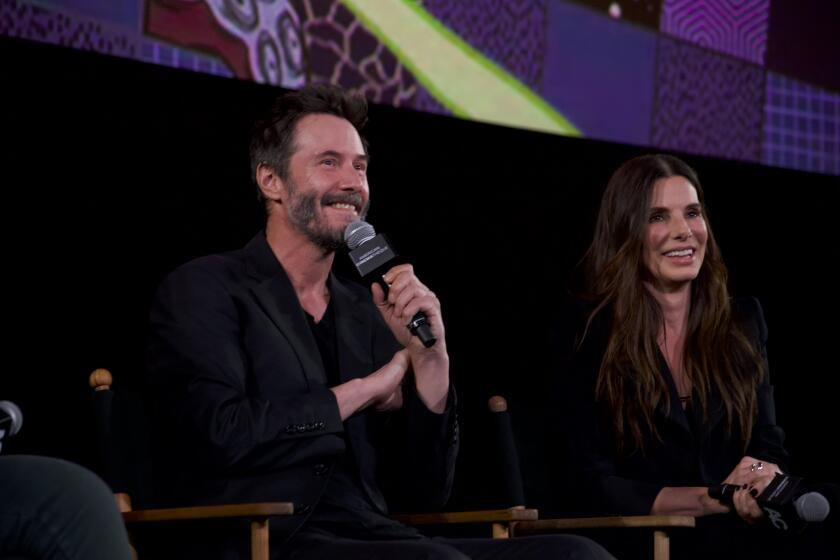French director Jean-Pierre Melville celebrates a centennial, with an approach that never goes out of style
Opposites not only attracted but they also joined and thrived to thrilling effect in the life and work of director Jean-Pierre Melville.
French through and through, he often wore a Stetson and changed his name from Grumbach to Melville because he greatly admired America, its movies and the author of “Moby-Dick” in particular.
Once best known as a filmmaker whose independence was an inspiration to the French New Wave, he now commands at least as much respect and interest as they do — witness the splendid series starting Aug. 4 at the American Cinematheque’s Egyptian Theatre in Hollywood.
“Jean-Pierre Melville at 100,” timed to celebrate the centenary of his birth, showcases features from both sides of his creative personality, playing in either DCP restorations or rare 35mm prints. The filmmaker’s nephew, Remy Grumbach, will introduce many of the selections.
Melville, who was a hero of the French Resistance during World War II, used psychological acuity and stylistic dazzle to celebrate make-believe bravery in his films. He made movies about moral dilemmas as if they were thrillers and treated his thrillers like exercises in morality. He died of a heart attack in 1973 at age 55, but he’s never been more popular than he is today.
While the moral films, which tend to have the Resistance as a setting, are more profound, the crime films, where hard and lonely men live by their own unwavering code as they walk the meanest streets in town, are inevitably more diverting.
The greatest of the moral films is arguably 1969’s knockout “Army of Shadows,” starring Lino Ventura as a key Resistance operative. It emphasizes the unheroic nature of heroism, its undramatic matter of factness.
Shot in bleak, muted color, “Shadows” gives a sense of how savage and unrelenting the demands of wartime can be, and of how alone and hopeless those who commit to action can feel. History may glorify them now, but at the time, these individuals despaired of their frailties and worried that they were not doing enough.
Also set during the war is Melville’s first picture, 1949’s “Le Silence de la Mer,” based on a novel whose author allowed the filming only if Melville promised to destroy the negative if a jury of former Resistance fighters disapproved of it. “Silence” is a strange and mesmerizing movie, taking place almost entirely in a rural French house. A German officer is billeted there with a woman and her uncle, but the pair refuse to speak to him.
Gradually, as the film combines images and sounds but avoids conventional dialogue and action, the relations between these people change in a way that is as dramatic as it is almost imperceptible. Because this precise, austere movie predates the celebrated work of Robert Bresson, Melville could justifiably claim, as he did, that “it’s Bresson who has always been Melvillian.”
Perhaps the most unusual of Melville’s moral tales is 1961’s “Léon Morin, Priest,” starring Jean-Paul Belmondo, the hottest actor in France after 1960’s “Breathless,” as a confident, charismatic, way handsome priest. No wonder Communist and atheist Barney (Emmanuelle Riva of “Hiroshima Mon Amour” and, much later, “Amour”) can’t get him out of her mind.
An examination of the intertwining of the great passions of romance and religion, “Léon Morin” is taken up with what can be described only as a religious flirtation, with priest and parishioner engaging in theological discussions that always have an undercurrent of sexual tension about them. Belmondo is cast more to type in “Le Doulos.” It’s not the first of Melville’s gangster films (that would be 1955’s lighter, more romantic “Bob le Flambeur,” the story of a professional gambler who wants to cap his career by robbing the casino at Deauville), but it’s one of the most involving.
Written by Melville from a French crime novel, “Le Doulos” has a plot of fearsome complexity, containing betrayals and counter-betrayals as everyone wonders who the informer in their midst might be. Starring Belmondo alongside veterans like Serge Reggiani and Michel Piccoli, “Le Doulos” begins with an unexpected death and specializes in actions that defy immediate explanation.
Also reappearing from the moral tales is “Army of Shadow’s” Ventura, who stars as an escaped gangster who wants to restart his life of crime in “Le Deuxieme Souffle,” Melville’s most commercially successful thriller. But the director’s most frequent star, especially as his style got increasingly pared down, was Alain Delon, an actor with the beautiful, blank face and dead eyes of a killer angel. Delon is in three of Melville’s movies, including 1970’s “Le Cercle Rouge” (costarring with Gian Maria Volontè and Yves Montand in an icy tale of jewel thievery, betrayal and revenge) as well as the last picture Melville made, 1972’s “Un Flic.”
Co-starring the unlikely duo of Richard Crenna and Catherine Deneuve, “Un Flic” boasts not one but two knockout robbery sequences, the first, at a French seaside town in the deserted dead of winter, unfolding as ritualistically as a Japanese tea ceremony.
Delon is also the star of what is likely Melville’s gangster masterpiece, 1967’s “Le Samouraï,” an austere poem of crime so admired that it’s the only feature the Cinematheque is showing twice.
“Le Samouraï’s” plot returns to one of Melville’s favorite themes, the links between criminals and those who enforce the law, and the intricate mechanics of their parallel operations. An attempt by the police to trap Delon’s Jef Costello on the Métro, a system he knows as intimately as the Phantom knows the catacombs under the Paris Opera, is one of the film’s most bravura sequences.
Never an effusive director, Melville pared his style as far as it could go in “Le Samouraï,” muting the colors to the point where he chose the bird that is Jef’s only friend because of its black and white plumage and keeping the dialogue to terse exchanges: “Who are you?” “It doesn’t matter.” “What do you want?” “To kill you.” Elegant, dazzling and totally individual, it will, like all the best of Melville, end up leaving you breathless.
‘Jean-Pierre Melville at 100’
At the Egyptian Theatre, 6712 Hollywood Blvd., Hollywood
All screenings are at 7:30 p.m. except as noted.
The schedule:
Aug. 4 — “Le Deuxième Souffle”
Aug. 5 — “Le Samouraï”
Aug. 5 at 10 p.m. — “Le Silence de la Mer”
Aug. 6 — “Le Cercle Rouge”
Aug. 10 — “Léon Morin, Priest”
Aug. 11 — “Army of Shadows”
Aug. 12 — “Le Doulos”
Aug. 12 at 10 p.m. — “Un Flic”
Aug. 13 at 5 p.m. — “Le Samouraï”
Aug. 13 — “Bob le Flambeur”
See the most-read stories in Entertainment this hour »
More to Read
Only good movies
Get the Indie Focus newsletter, Mark Olsen's weekly guide to the world of cinema.
You may occasionally receive promotional content from the Los Angeles Times.










